September 8, 2016
The Nosyhood, by Tim Lahan
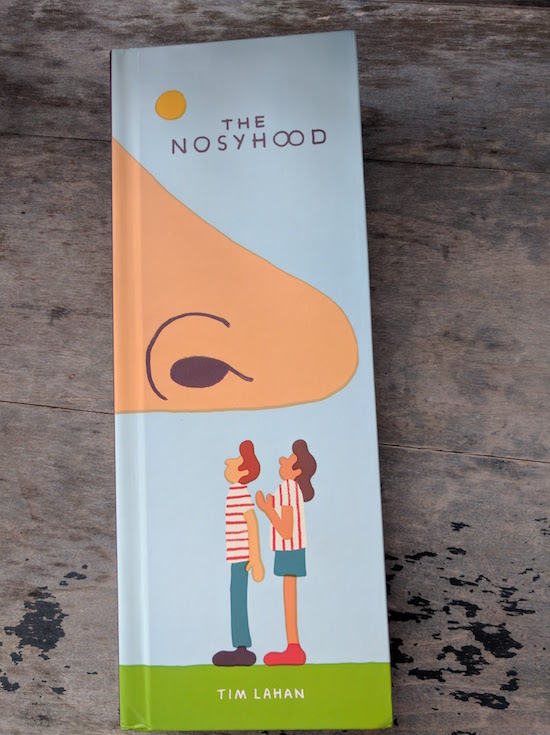
Tim Lahan’s first picture book, The Nosyhood, is full of surprises, the first being its size, which is very tall, the book making excellent use of its extraordinary height and being spectacularly conscious of itself as an object (which is very satisfyingly gripped in one’s hands) and the space it has to tell its story.
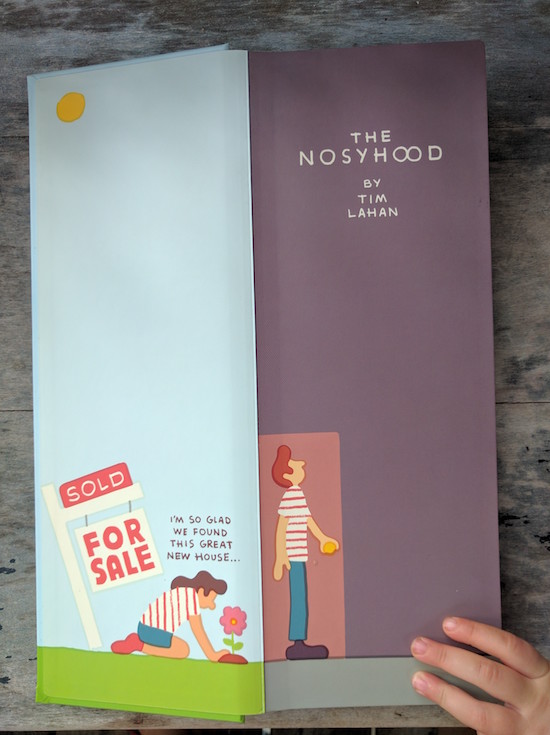
It’s the story of an unassuming young couple who buy a house, the book’s centre functioning as their home’s threshold. “I’m so glad we found this great new house,” says the Her of the couple, with no idea what their neighbourhood has in store for them.
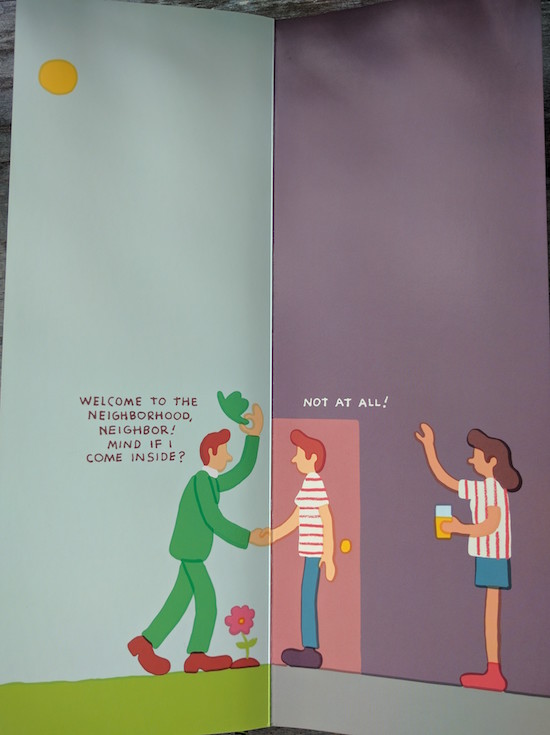
At first it seems pretty positive—a friendly neighbour (in a green suit) stops by to so hello, and they invite him inside. They’re even cool with the woman who shows with with a bowl full of fruit, and the baker with a three-tiered cake (well, wouldn’t you be?) but when Arnold Schwarzenegger shows up (“Ready to pump a little iron?”) things start to get a little weird. And the party inside is beginning to get a little crowded.
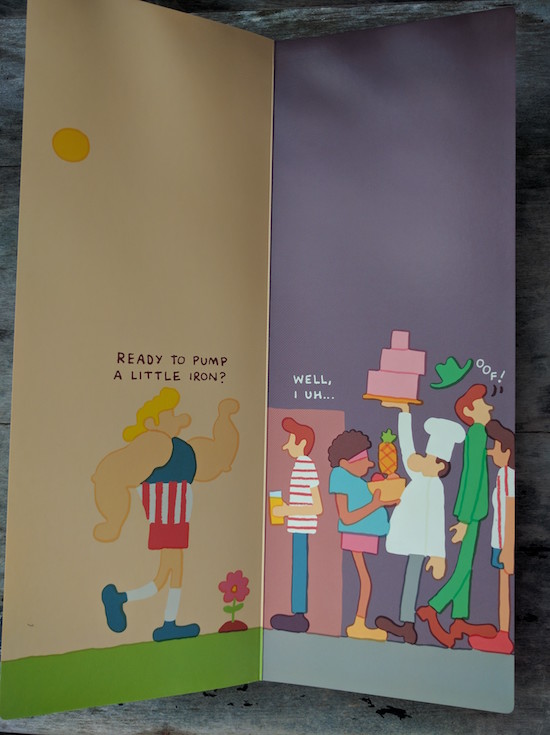
There’s the guy with the canoe, and then the clown with the balloons, and pretty soon this very tall book doesn’t seem tall enough. For the most part, Lahan lets his images tell the story, although they’re nicely punctuated with some dialogue by the party-goers.
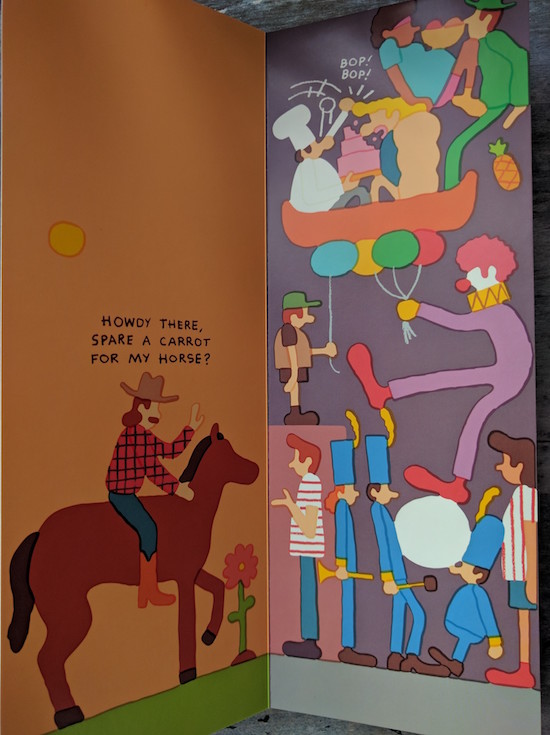
The brass band might seems like it’s all gone too far, but there’s still time for the guy on a horse (who’s not just looking for a party, but wants a carrot) and it was here where I realized how wonderfully The Nosyhood reminds me of the works of Remy Charlip, books like Mother Mother I Feel Sick and Arm and Arm and I was definitely thinking about Little Old Big Beard and Big Young Little Beard: A Short and Tall Tale.
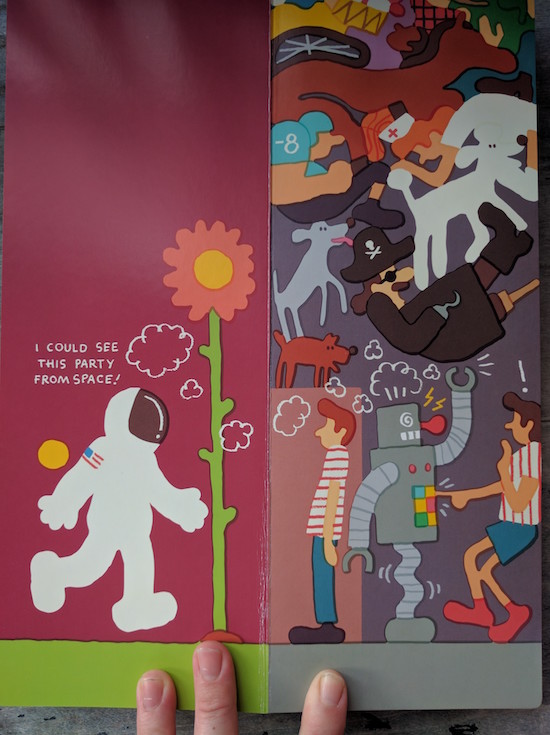
It gets absurd. There are donuts by bylaw and the basketball player who turns up saying, “You guys are way more fun than the last seven couples who lived here…” There is the astronaut and the robot and a pirate and three dogs, and you get the sense the something’s gotta give. And when it does, it’s a nose that come around and stopped to sniff the flowers, and when that big nose starts sneezing, everyone would be advised to take cover. 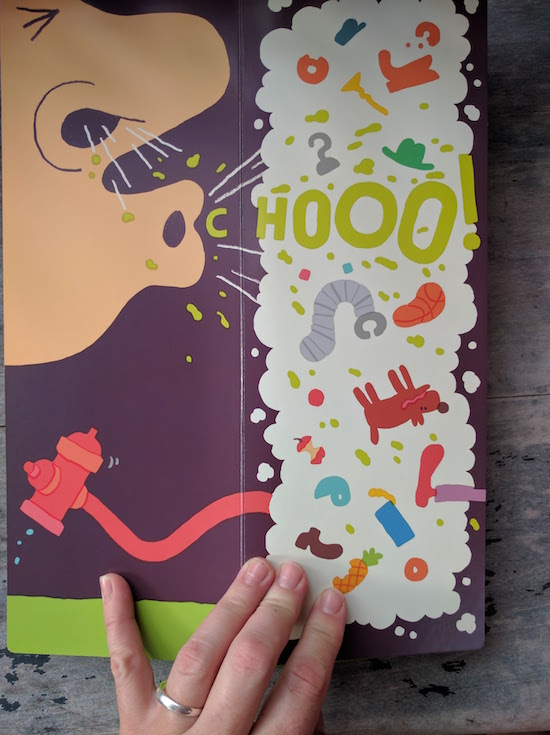 “I feel like this might not be the best neighbourhood for us after all,” the He from the couple is saying to Her at the end as they clean up from the disaster. A perfect, hilarious, understated end to this very funny and clever book.
“I feel like this might not be the best neighbourhood for us after all,” the He from the couple is saying to Her at the end as they clean up from the disaster. A perfect, hilarious, understated end to this very funny and clever book.
September 7, 2016
Listen Again
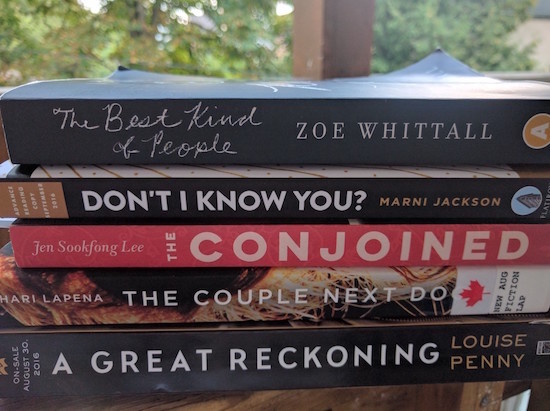
I was so happy to talk books again today on CBC Ontario Morning. If you didn’t catch the broadcast, you can listen again on the podcast. I come on just after 33 minutes, and oh my, did I ever have some great books to tell you about, including Zoe Whittall’s The Best Kind of People, which was just long listed for the Scotiabank Giller Prize.
September 6, 2016
On Reading Grace Paley Wrong
 The thing about years, of course, is the way they’re layer upon layer. Today I dropped Harriet off at Grade Two, which is not such a departure from Grade One—same great teacher, same beautiful classroom. And then Iris and I headed down the street, back to playschool, and it occurred to me that it was four years ago today that I first entered the playschool as a member of its community. As I did today, I showed up for my requisite two hours of cleaning to help get our (cooperative) playschool all set for the new school year. It was also the day that Zadie Smith’s NW came out, which I’d had on special order from Book City, but that is neither here nor there. I’d been about five minutes pregnant with Iris at the time, but I didn’t know it for sure—it would be another week or so before my pregnancy would be confirmed.
The thing about years, of course, is the way they’re layer upon layer. Today I dropped Harriet off at Grade Two, which is not such a departure from Grade One—same great teacher, same beautiful classroom. And then Iris and I headed down the street, back to playschool, and it occurred to me that it was four years ago today that I first entered the playschool as a member of its community. As I did today, I showed up for my requisite two hours of cleaning to help get our (cooperative) playschool all set for the new school year. It was also the day that Zadie Smith’s NW came out, which I’d had on special order from Book City, but that is neither here nor there. I’d been about five minutes pregnant with Iris at the time, but I didn’t know it for sure—it would be another week or so before my pregnancy would be confirmed.
It was a strange and vivid year, the year that Harriet was three and I was pregnant with Iris. I’ve written before about all the women I met, those hours we spent in the playground not bothering to take our children home for lunch because the conversation was just too fascinating. I remember taking my shoes off on days when it should have been too cold to be doing such things, but the sunshine had rendered the sand hot and glorious, and I liked to bury my feet in it. I remember that warmth, and those hours, and how conversations seemed to unspool, landing in messy piles all around us.
And then tonight I saw that Sarah was reading “Faith in a Tree,” by Grace Paley, and it occurred to me to get my own Collected Paley off the shelf and read Faith again. And reading it, I realized that probably I’ve been reading the story all wrong all these years. That so besotted was I by the idea of co-workers in the mother trade and those mothers in the park, and all their talk, that I hadn’t really paid much attention to the end of the story: “…Then I met women and men in different lines of work, whose minds were made up and directed out of that sexy playground by my children’s heartfelt brains, I thought more and more and every day about the world.”
I really thought that they’d been it, those mothers in the park. I really had thought she meant that this, the mothers stopping to talk, was the most important conversation. But it wasn’t, her revelation. Faith needs more than that, chatting women lounging in trees. The world needs more than that, at least if we ever expect to do anything about it. Whatever the women in the playground are doing, they’re not thinking more and more and every day about the world.
It doesn’t shock me as much as it might have, to discover that a beloved passage of a story doesn’t mean what I thought it did at all. It is possible that kernel of the truth of the matter had lodged its way into my mind. When I wrote my own post about my co-workers in the mother trade, I remarked on the fleetingness of it all, that those conversations had happened in a moment. A time when I searching for my own moorings as a parent, as a mother, and when the possibilities were still terrifyingly wide-open. I don’t really hang out in playgrounds anymore, not the way I once did, whiling away hours as the sun crossed the sky. There’s always someplace else I’ve got to be, one more thing I’ve got to get to. I suppose you could say I’m thinking more about the world, though it’s not quite so noble as that.
September 5, 2016
Summer Thanks
Dear Summer 2016:
Thank you for being too much. Thank you for being too hot and sweaty, and too exhausting, and too nutty and too intense…and also for not being long enough. And/or for being over at precisely the right moment.
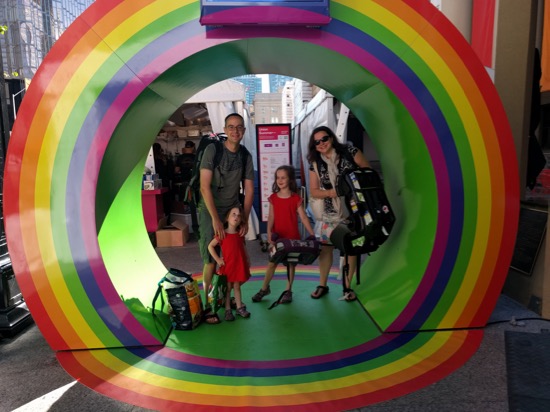
Thank you for train travel, books and tea to pass the time with, and delicious sandwiches packed in wax paper. Thank you for Lake Ontario sweeping by outside the window, our companion for most of the journey. For Napanee for making me think of Avril Lavigne, and Sk8ter Boi. Can I make it any more obvious?

Thank you to friends who received us, let us sleep in your spare rooms and eat cereal from your bowls, and friends who gave us dinner and poured us wine and made us feel so entirely welcome. Thanks to friends who showed us your city and made us fall in love with someplace new.
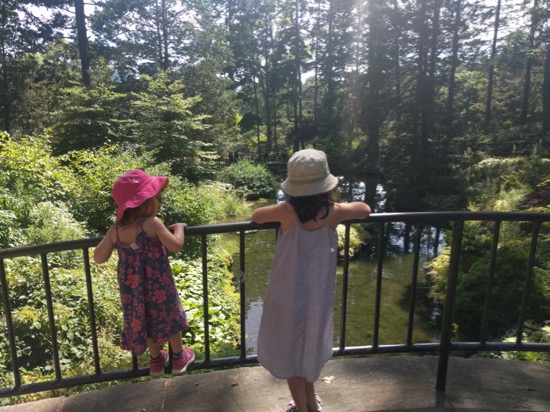
Thank you to to High Park for always making for a perfect summer day. Thank you for your splash pad, overpriced ice cream cones, your steep grades, and sparkling pond, your chipmunks and geese for delighting and scaring us (respectively).

Thank you to Peterborough for letting us hang out for a few days. Thank you to the Millennium Park for your perilous rock structures that the children liked to leap from.
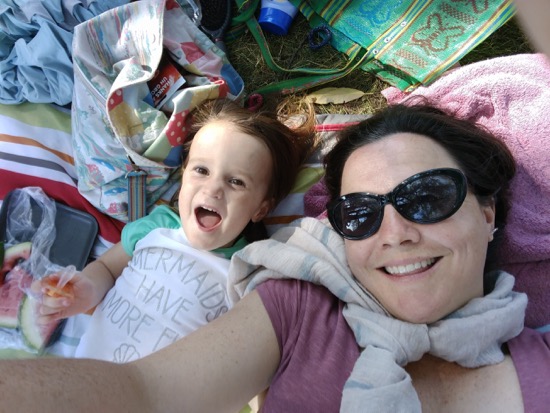
Thank you for the sunshine and your shady trees, and days beside a lake.

Thank you to the Grandparents who hosted us and their friends who let us swim in your pool (and kayak even!).
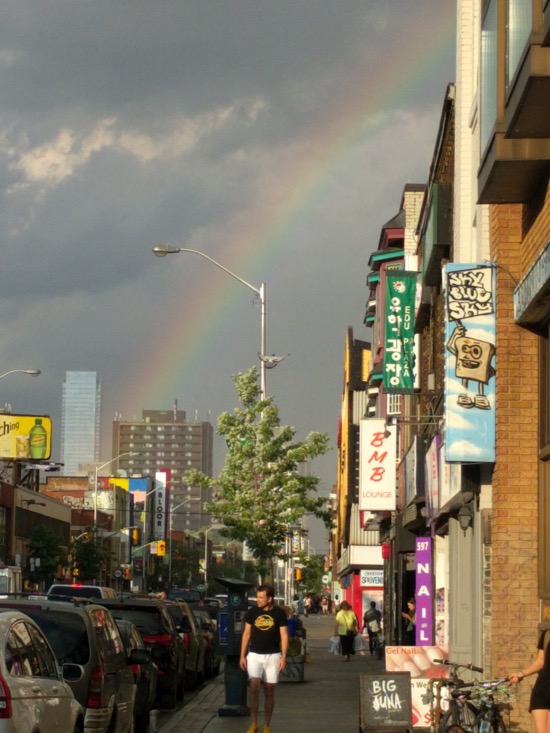
Thank you for your rainbows, dear summer. For your silver linings and consolations, your tough lessons and your toughening ones, and for your refusal to let Don*ld Tr*mp and Brexit own you. For being better than all that.
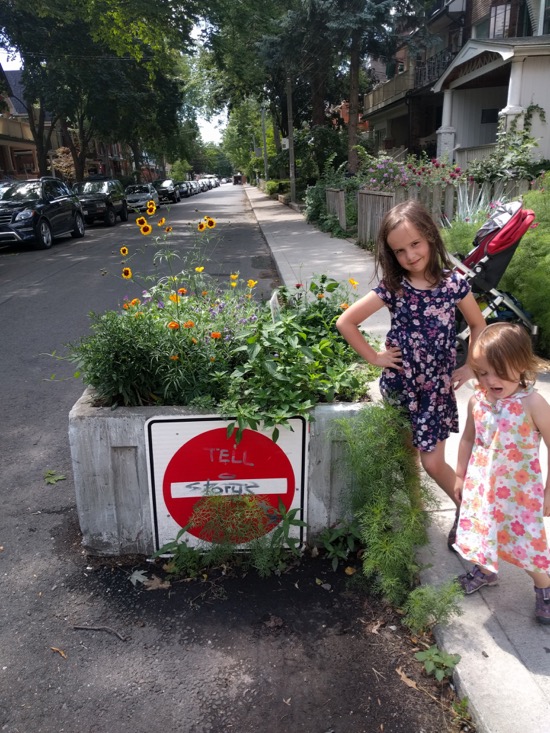
Thank you for the things that grew, even if they weren’t the lupines. Thank you for the lavender and the marigolds, and the cosmos that grow in the street and amaze us with their tenacity.

Thank to the Chihuly exhibit, for being fascinating for all of us. Thank you to the museum for your air conditioning on hot afternoons.
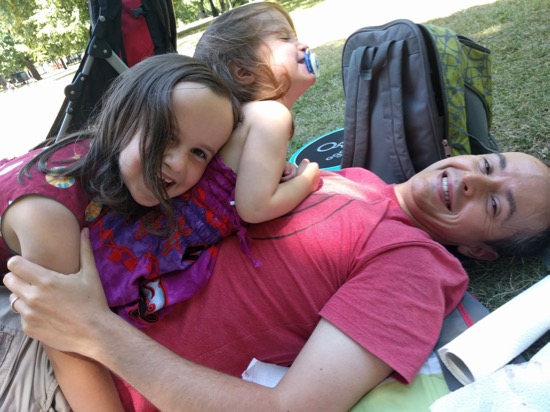
Thank you for the parks, and the picnics, and the piles of people I thoroughly love.
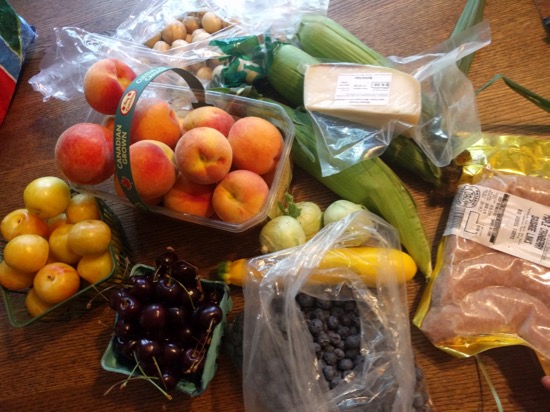
Thank you for the farmer’s market, which becoming deliciously slutty as July turned into August and the peaches got ripe. 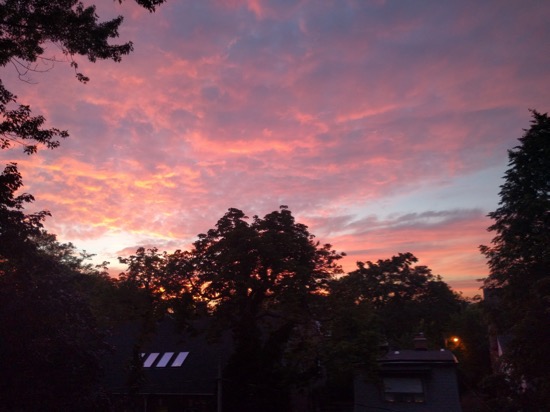
Thank you for the summer skies at dusk, every evening a reminder that the world is amazing.
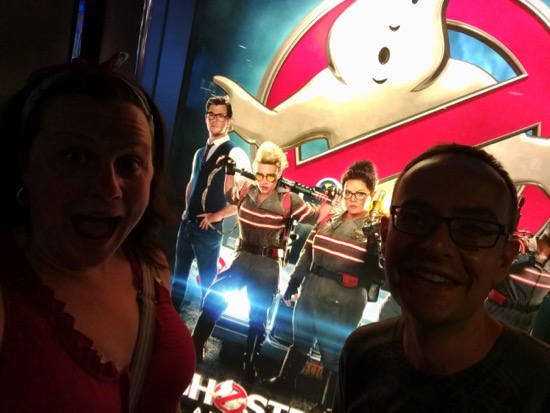
Thank you to Ghostbusters for being ridiculously fun.
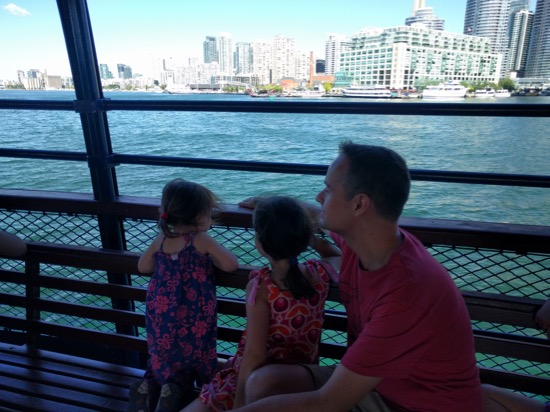
Thank you to ferry rides and the Toronto Islands, and wholly perfect days.

Thank you for afternoons passed on the Toronto Riviera.
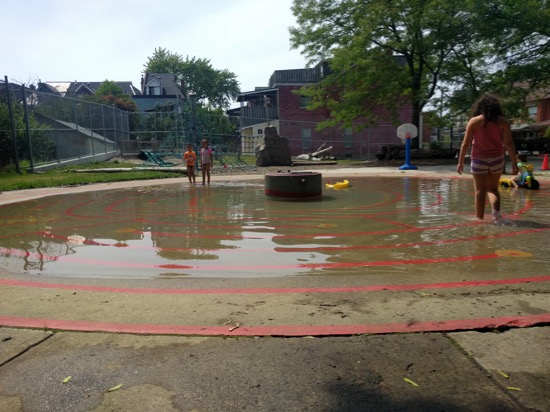
We’re grateful for wading pools, and for the children for giving me an excuse to hang out in one. Where would I be without them?
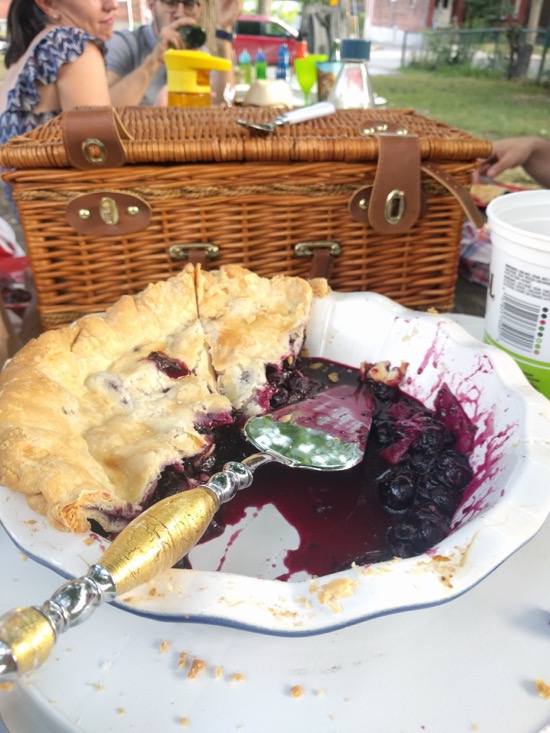
Thank you for the picnics in the park, and Denise’s blueberry pie, and the most amazing friends a family could ask for.
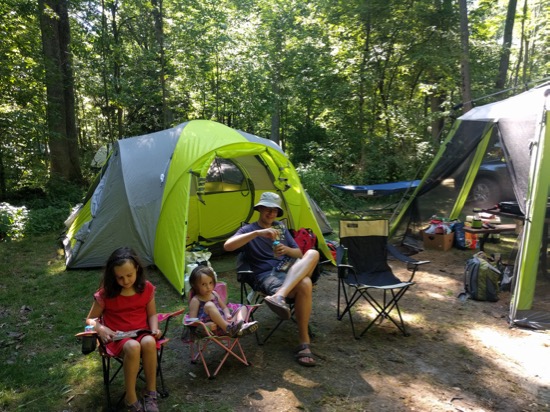
Thank you to fire, for letting us make you. Thank you for only raining a little bit on our camping weekend, enabling the weekend to be so totally fun. Midway through the summer and we were still going strong.
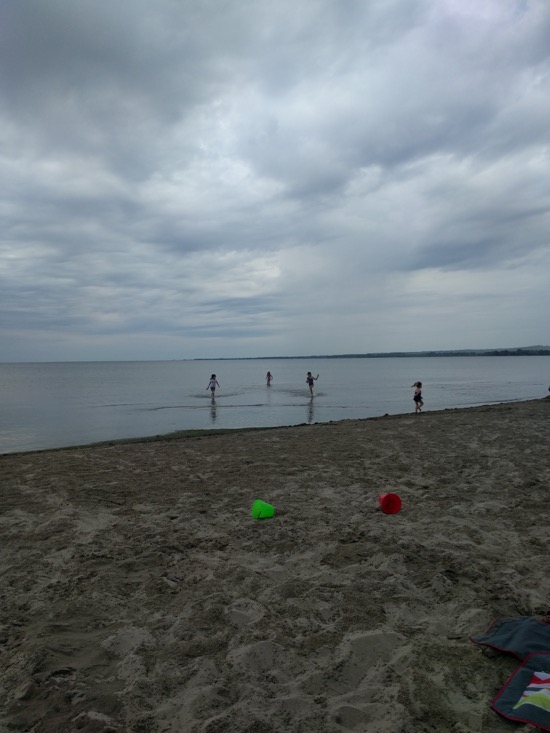
Thank you summer for your moody skies, and unforgettable afternoons with friends.
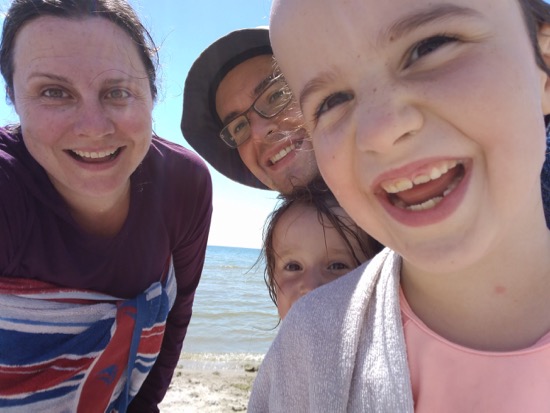
Thanks for the big beach smiles, and one more swim before we hit the road, and so much sand in the car.
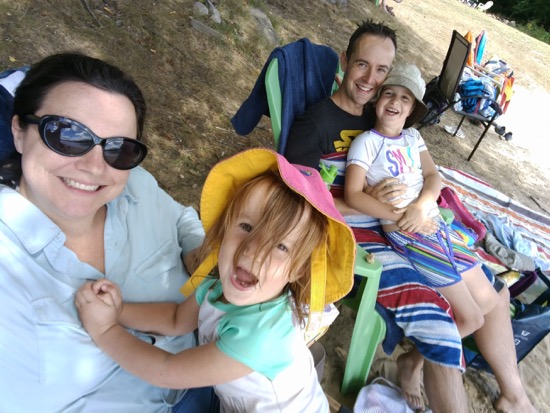
Thank you for a week at the cottage, a week that rocked everybody’s world, and left us so relaxed and happy and me only moderately rashy.

We are thankful for big jumps off the dock.
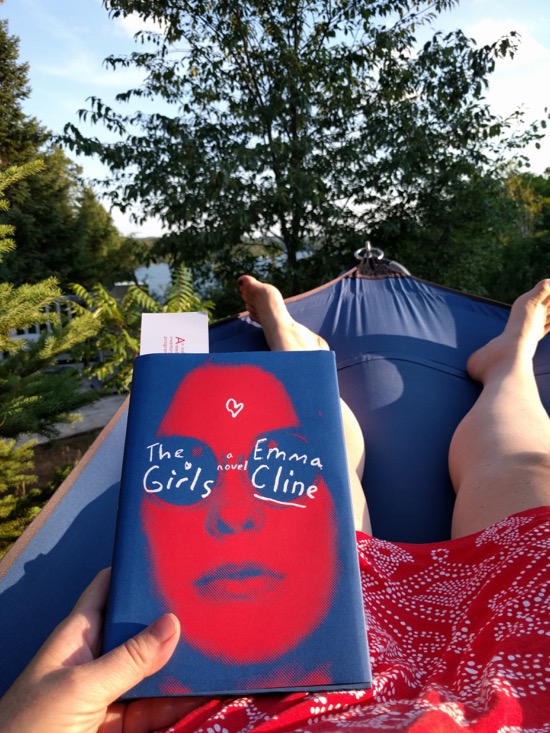
We are so thankful for hammock afternoons, and books that match our outfits (even if the book itself didn’t quite live up to the hype).

Thank you for ice cream from a truck. And ice cream from anywhere, for that matter.
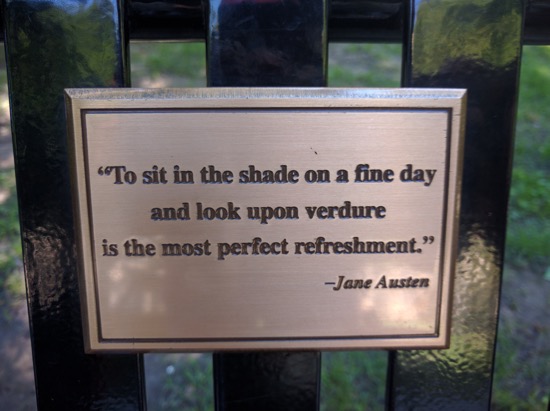
Thank you for perfect refreshment over and over again.
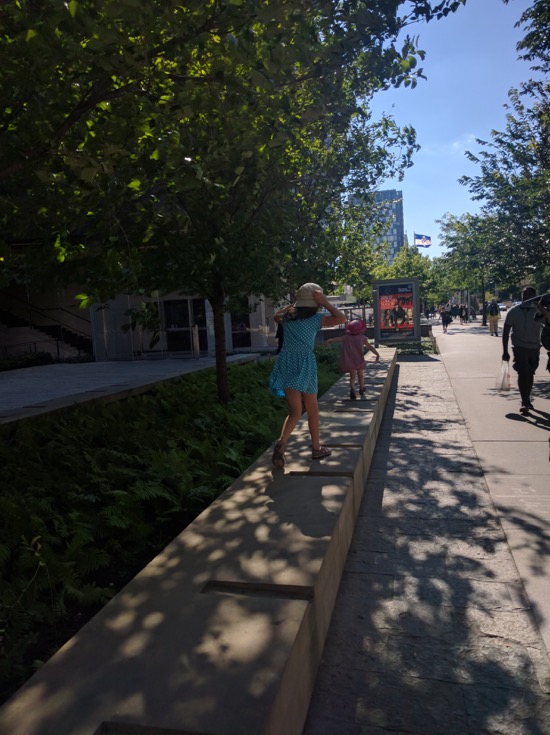
Thank you for your green trees and your cool shade and so many things to climb on along the journey home.
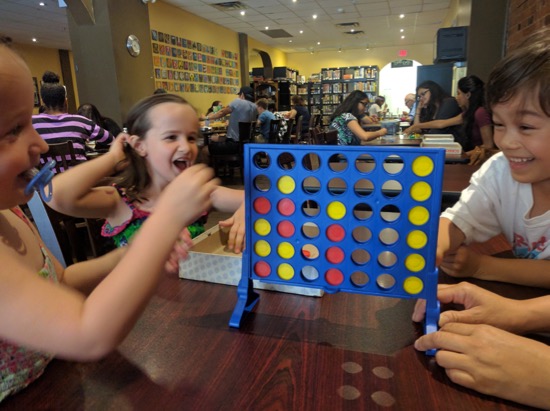
Thank you for silliness with friends, at the board game cafe, and the Science Centre, and in shady backyards, and other memorable points along the way.
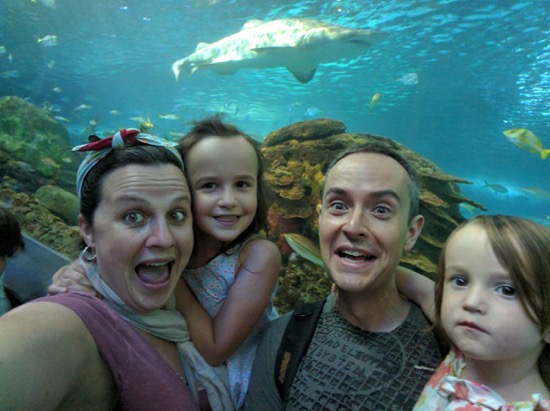
Thank you for your magic and your mystery tours, and for the sharks.
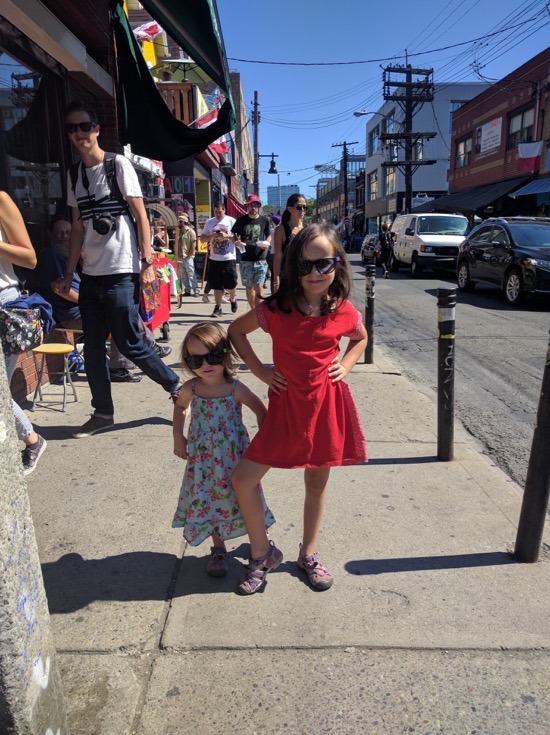
Thank you for your street style, your shades, and your cool attitude.
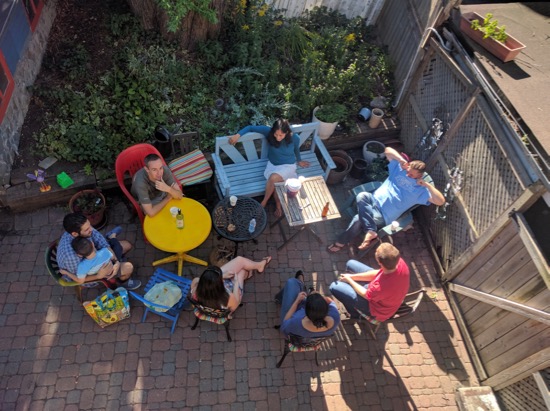
For the sunny days.
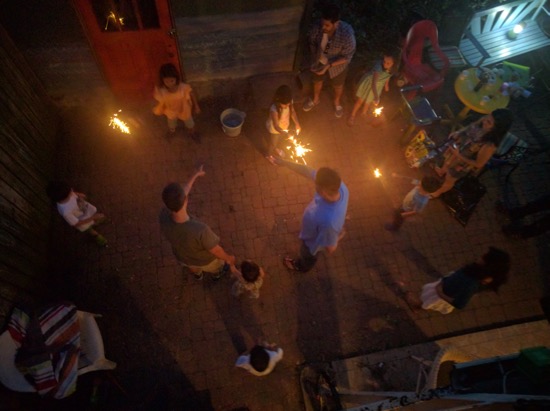
And the sparkling nights.
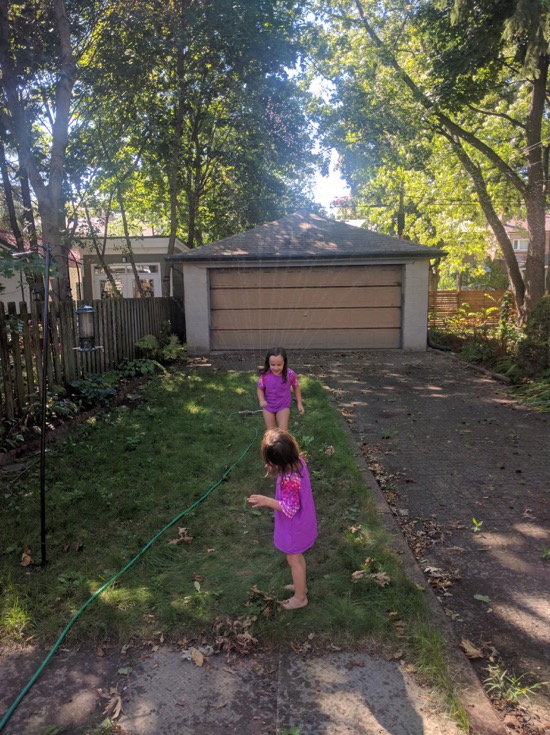
For your green lawns and garden hoses…
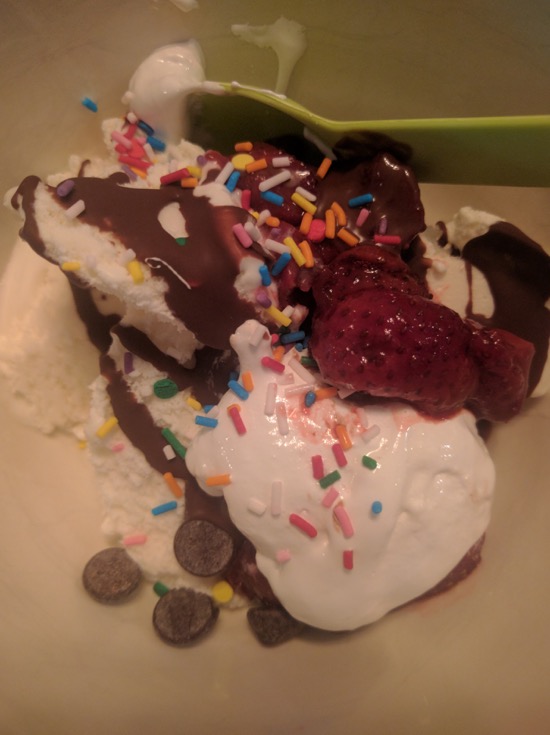
and for including all the fixings.

Thank you for your triumphs and glories and deliriously dizzy goodness.
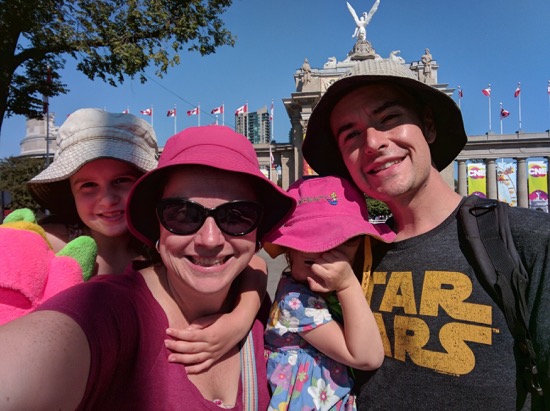
We had a very good time.
Love,
Us
September 2, 2016
All the World a Poem, by Gilles Tibo and Manon Gauthier
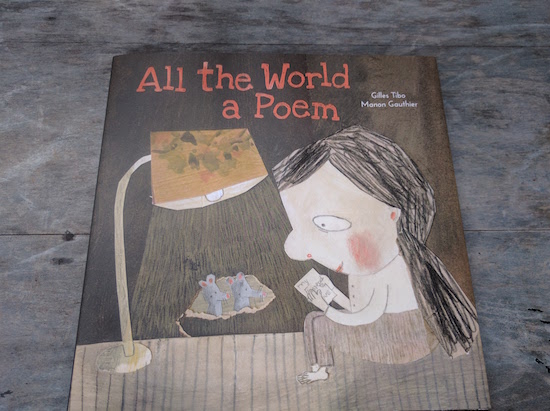
I am totally in love with All the World a Poem, a celebration of the poetry in the world and the world that’s in poetry, written by Gilles Tibo and illustrated by Manon Gauthier, both award-winners in Quebec and internationally. And now their book has been beautifully translated into English by Erin Woods, whose task fascinates me in what it means to translate a poem, poems being is so intrinsically about their language. It’s building the same object out of a different material, and I’m thinking about what changes, what’s retained, and how the translated poems are enriched even, deepened. The translation adds an entire level of meaning to what is already a deeply textured book. Woods delivers full credit for her role in making a book that’s so extraordinary.
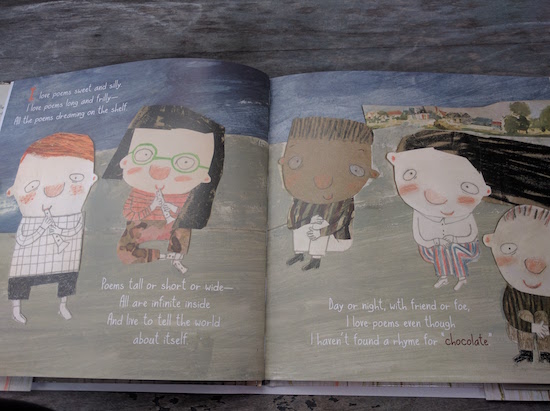
Each spread is a different poem celebrating poetry as diverse as the poets who write it, and sometime the poetry is literal (concrete?) and sometimes the poetry is simple (not simple) wonder at the world around one, ephemeral moments and fleeting flyaway things.
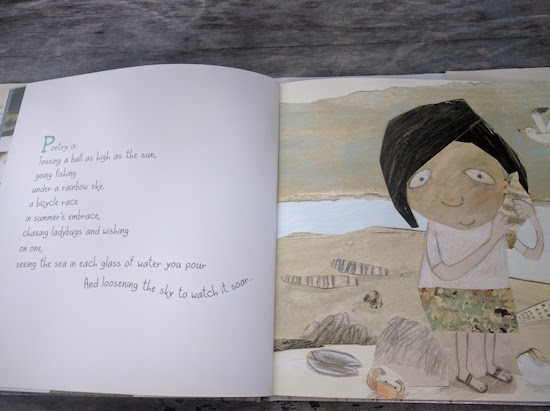
Sometimes the poems are loose and free (verse) and other poems rhyme with metre, not all of them obvious and my eldest felt particularly pleased with herself when she thought she’d figured one out.
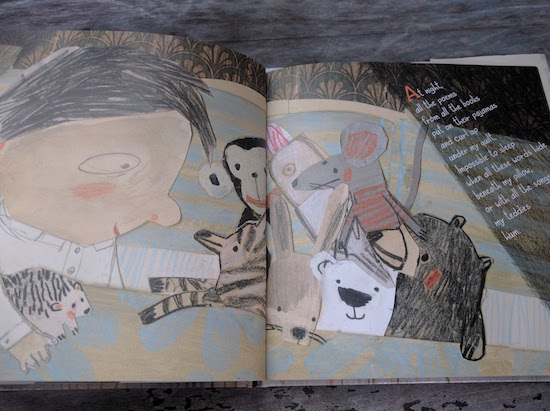
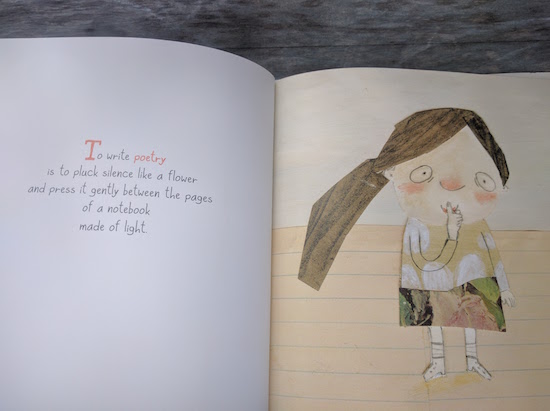
My favourite page is the one above, silence like a flower pressed between the pages of a notebook made of light. The poems themselves all sophisticated and yet accessible, like the illustrations with their childlike renderings and the richness of texture. Inspiring young readers to see the poetry at work in life and the world, to read it, and maybe even to sit down and write it.
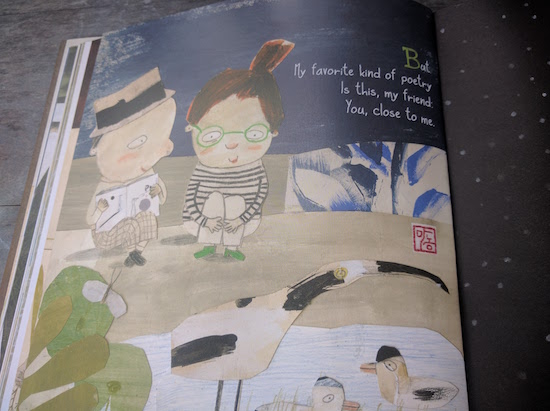
August 31, 2016
Extraordinary Day
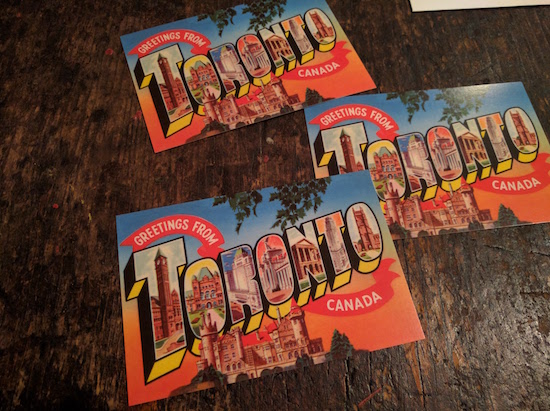
My favourite thing about being a parent is the way you get the make the world magic. The way you can wave an imaginary wand an transform an ordinary day into a extraordinary one. The way that my children had no idea what was up when we told them to get their shoes on at 8:30 this morning, and when they kept asking where we were going, we said they’d find out when they got there. They’d been expecting their daddy to leave for work as usual, but there we all were marching to the subway, south to Union. And then a walk along Front Street, and over the train tracks to the aquarium, because Harriet’s loves the aquarium, and had expressed a wish to go there again. There you go Harriet: wish granted. Amazing.

We had a terrific time at the aquarium, and the best part was when we ran into my best friend Jennie. After a few hours we were done though, and the place was completely bonkers, and so we left and meandered north to the place that had perhaps inspired this whole aquarium plan—the close-in-proximity, brand new Penguin Bookshop.
A bookstore that fits in your pocket, it is, or your closet, at least. Formerly a shoe repair kiosk. It features a lively selection of Penguin-branded goods and books they publish, Canadian and classic. I got the new Dave Eggers novel and The Bloody Chamber, by Angela Carter, and we bought a copy of Ooko because we’d had it from the library and loved it. It was very nice to finally stop by.
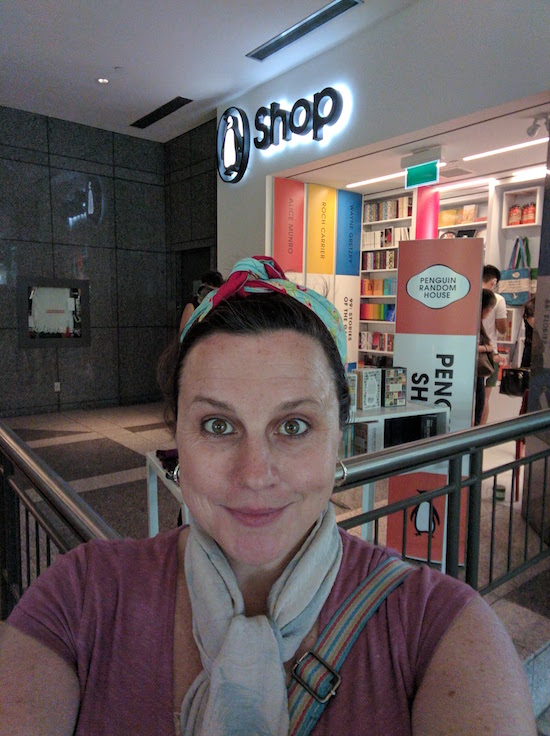
We had lunch at the Old Spaghetti Factory, which was completely fun, and totally not horrible or boring. And there was so much bread. The bad thing about being snobs who live downtown is that we don’t get free bread with our meals very often, and certainly not for lunch (and if we do, it’s spelt bread and nobody wants to eat it). The children thought the place was great and we thought it was surprisingly good, the perfect place to stop on this day of being tourists in our own city for a while.
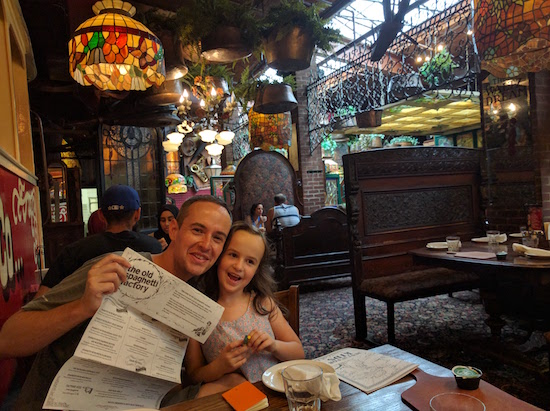
“And what are you doing with the rest of your day?” our waiter asked us as we paid our bill. “We’re going to visit Toronto’s First Post Office,” I told him. I told him, “You’ve probably been there a hundred times, right?” He gave me a look. When he finally bid us adieu, he said, “Have fun at the…post office.”
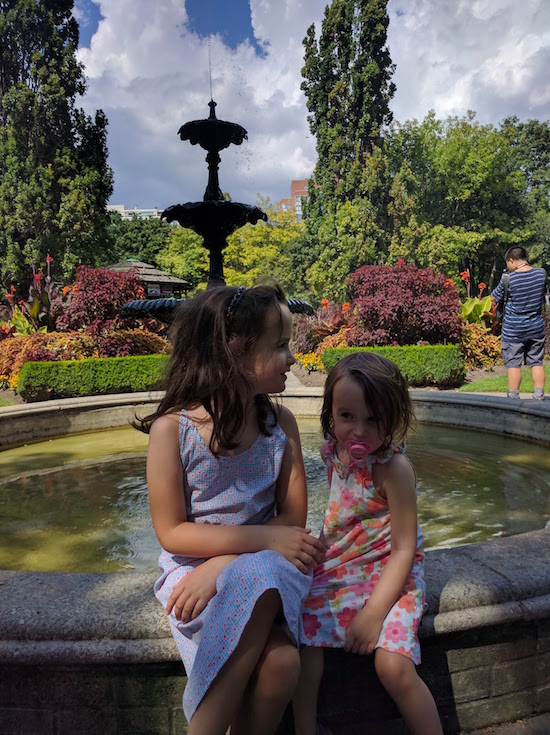
But not just any post office! It’s an actual working post office (and woo hoo! Canada Post and its employees have finally come to an agreement so we’re not going to be having a postal strike) AND a museum. From the restaurant, we walked through the beautiful St. Lawrence neighbourhood to get there, and finally arrived. Full disclosure, the children were being to lose their shit by this point.
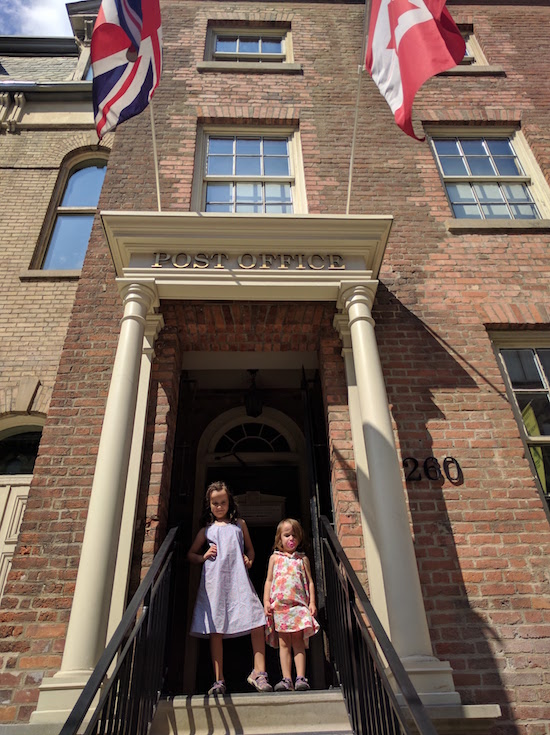
At Toronto’s First Post office you get to try writing with quills, and can also purchase stationary to write letters in their reading room. The place was marvellously busy, with tourists and also people coming in on ordinary errands. After finding out that writing with quills was really hard, Harriet and Iris sat down to write with ordinary pens, and they both ended up crying because a) over the summer Harriet had lost any writing skills she’d ever possessed and b) Iris had never possessed any anyway. And all I wanted to was write a letter to my friend, but the children were bananas and also doing dangerous deeds with ink, which ended up smeared all over Iris’s body, and then she blotted it with the sand provided for such things, and it all had gone a little bit awry. We pulled it together though, got letters written and even posted. And then it was time to admit that the day was coming to an end, so we headed for the subway, and nobody cried again, I think, so it all was a success.
August 30, 2016
Mister Nightingale, by Paul Bowdring
 In my friend Mark Sampson’s review of Paul Bowering’s last novel, the award-winning The Stranger’s Gallery in The Fiddlehead, he wrote, “Bowdring’s prose bursts with such clarity and assuredness that you trust his voice to take you anywhere it wants…” I know this because this excerpt from Mark’s review appears inside the ARC for Bowering’s latest novel, Mister Nightingale, and when I read that line, I thought, “Exactly.” Because while the notion of Bowdring’s novel as a “novelist’s novel” appeals to me—I love his send-up of literary culture, of small press politics, of comradeship and competition between writers, and all of that insider baseball—Mister Nightingale isn’t the kind of book I can manage to get through. And not just because it’s written by a man (she writes, unabashedly wearing her bias on her sleeve), because it’s about a man whose own literary bedrock is so definitively male. It’s all Kafka and his frozen heart, and James Joyce, and Proust, and all those people I’ve never read and never will because so many other people read them already that I don’t have to. Because I don’t trust any writer who doesn’t have a single literary foremother, or at least ten of them, and Bowdring’s James Nightingale never references one.
In my friend Mark Sampson’s review of Paul Bowering’s last novel, the award-winning The Stranger’s Gallery in The Fiddlehead, he wrote, “Bowdring’s prose bursts with such clarity and assuredness that you trust his voice to take you anywhere it wants…” I know this because this excerpt from Mark’s review appears inside the ARC for Bowering’s latest novel, Mister Nightingale, and when I read that line, I thought, “Exactly.” Because while the notion of Bowdring’s novel as a “novelist’s novel” appeals to me—I love his send-up of literary culture, of small press politics, of comradeship and competition between writers, and all of that insider baseball—Mister Nightingale isn’t the kind of book I can manage to get through. And not just because it’s written by a man (she writes, unabashedly wearing her bias on her sleeve), because it’s about a man whose own literary bedrock is so definitively male. It’s all Kafka and his frozen heart, and James Joyce, and Proust, and all those people I’ve never read and never will because so many other people read them already that I don’t have to. Because I don’t trust any writer who doesn’t have a single literary foremother, or at least ten of them, and Bowdring’s James Nightingale never references one.
And yet, there was something about the narrative. While in most books, the lack of foremothers would be off-putting, I was willing to forgive it of Mister Nightingale. Because of what Mark wrote about the clarity and assuredness of Bowdring’s prose that I trusted enough to follow. Because (and I am not kidding, this is usually a deal breaker for me): in the entire book, there is not a single blowjob (and this is another reason why I tend to avoid books by men. Ubiquitous blowjobs. They go on for paragraphs and paragraphs. It’s really quite unbearable). And because there was this strange and uncanny echo in the novel of Carol Shields’ Unless, and I’m not saying this was anymore than me making weird connections, but they were vivid ones. James Nightingale, like Reta Winters, a semi-successful novelist, belying the ordinary lives and concerns behind the writer’s persona. James’ estranged wife is called Alicia, who plays viola in an orchestra, although in Reta Winters’ fictional novel, her heroine Alicia is engaged to a man who plays trombone in an orchestra, and so the lines aren’t exactly parallel, but still, one reminds me of the other. Mister Nightingale raises the question of unlived lives, as does Unless and also Shields’ The Stone Diaries, James considering the experiences of his neighbour who discovers her freedom and possibilities when her husband dies and her children are grown, and he also considers his own lives, the ones he might have lived, had he made other choices. Both characters also deal with the demands of elderly parents, and the peculiar, tangled nature of relationships with daughters on the cusp of womanhood. In many ways, these books are spiritual siblings. I think they’d get along.
Mister Nightingale begins with James’ return to his native Newfoundland after 30 years away. He’s even missed his own mother’s funeral, but now they’re offering him an honorary degree, and a local press is reissuing his first book. Plus his marriage has ended in Toronto and he doesn’t know what he’s going to do next, so it seems like a good time to return to the scene of the crime. The crime being the small press publisher ripping off James’ friend, the poet, Kevin, who didn’t get paid for sales of his book and who was furious to discover his poetry published in a high school English text and he hadn’t been paid for that either. So naturally, things are going to get more than a bit interesting at James’ book launch (although the date for that event is being postponed over and over again, in absolutely true small press fashion).
But in the meantime, James takes stock of his life, tries to reconnect with his father, encounters ghosts from his past, learns all the ways that Newfoundland has changed and stayed the same in the last three decades, and keeps some tabs on his daughter, who has just started university in St. John’s. He becomes reacquainted with his sister, gets a Newfoundland driver’s licence, partakes in an ill-attended book signing at the local Chapters, and gets drunk on local TV.
All of which is to say that the novel is not terrible plot-driven, but we go there anyway, with pleasure even, for all the reasons recounted above. Mister Nightingale is a smart, funny and absorbing book, and I’m so glad I went along on its journey.
August 29, 2016
The Art of Blogging begins again…

My very favourite part of my blogging course is week 6ish when we talk about what blogging has to do with cake, getting lost, Maira Kalman’s The Principles of Uncertainty, and hope in the darkness. If you care to take a crash course, you can do so here, but if you feel like joining us, I’m pleased to let you know that The Art of Blogging starts on October 3 and runs until the end of November at the University of Toronto’s School of Continuing Studies. You can register now, and I do hope some of you can make it.
August 25, 2016
The Body Book, by Roz MacLean
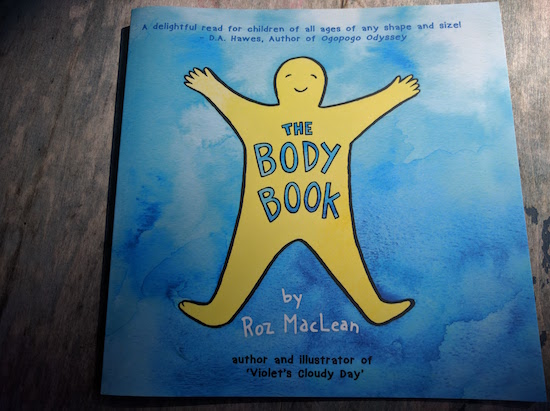
If my copy of Lindy West’s Shrill hadn’t been from the library, among the countless parts I would have underlined would have included the part where she states that she’s never actually hated her body, or felt loathing toward it, but instead was just all too aware that the rest of the world thought that it didn’t conform to its standard. Which has always been my experience, for the most part (which, full disclosure, is also fairly easy for me to say, because my body has rarely deviated very radically from the standard, and let me tell you, there were some years when my body was pretty smoking’ hot [1997 and 2007 in particular were good years; maybe it’s a decennial thing, in which I’m holding out big hopes for the forthcoming annum]).
Truth: I’m still working on losing the baby weight from my second pregnancy—if by “working on losing the baby weight” you mean “eating a lot of croissants and not giving a fuck about the baby weight.”
I’ve always aspired to be quite at home in my body. When I was 17 and wrote for a teen section in our community paper, I plagiarized an article I’d read in a teen magazine about the contentment of a girl who’s eating a McDonalds hot fudge sundae—I wanted to feel that good about myself. That I had to steal the idea though is perfectly telling.
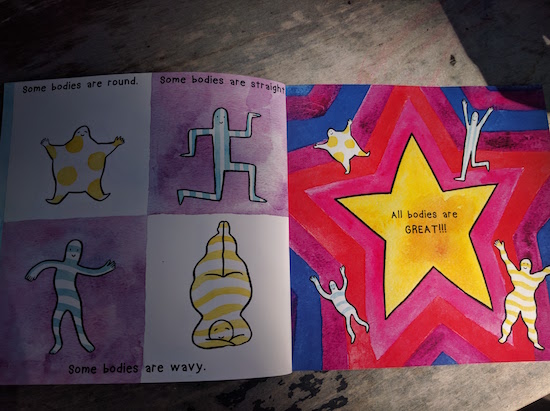
In 2001, I made my friends come with me to the nude beach at Hanlon’s Point when I stripped down to nothing and walked across a beach full of people on my way for a swim, which was truly a life-changing and empowering experience.
In 2012, I took a photograph of myself in a bathing suit and put it on the internet, which I thought was a big deal at the time (and I hadn’t even gained the baby weight!).
Last week I did the same thing again, but by now this didn’t feel remarkable. (What I wrote beside the image did though. “So glad to live in this body,” I captioned the photo, which is, in all honestly, one of the most subversive, badass things a woman can say, and what does that say about us?). And the single biggest thing that I can credit for finally attaining the self-acceptance I’ve been chasing for two decades is this one thing, or two?
I have daughters.
When I became a mother, I made several promises to myself, many of which I eventually broke (including, I will always speak kind and respectfully to my children; I will never bitch at them for reading too much [I know!—but seriously, put the book down, Harriet]; and I will never suddenly exclaim in the middle of an afternoon, “Oh my god, oh my god, all of you, now, just GO AWAY!”). But one promise I have forever stayed true to is that my children will never hear me say a negative word about my appearance. Not one. Because I think that as much as some women may dislike their appearances, all the more omnipresent is the fact that we’re kind of taught that we have to. It’s how to be a woman. Permitting yourself four almonds for a snack, and worrying about “muffin tops” and back fat. So much of it is a learned behaviour, if even by osmosis, and of course it is, because it’s everywhere.
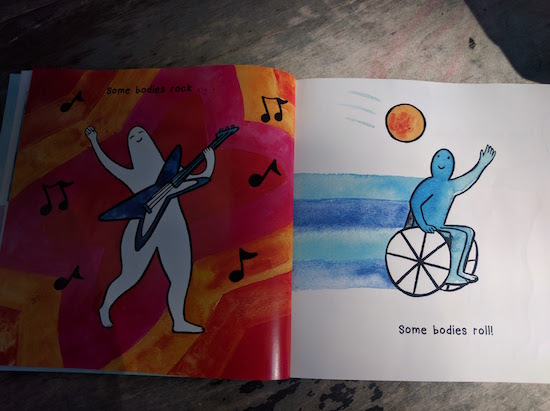
But not in our house. There came a point when I realized our eldest was listening to every word we said and then I stopped whining, “I feel fat” and “I’m ugly!” to my husband whenever I was feeling blah (and let me tell you, other than me, there is no one involved in my personal transformation who has benefitted more than my husband, who apparently doesn’t miss my insecure neediness. Who knew?). I started delivering non-sequiturs at dinner like, “Man, I sure like my freckles,” and “I think my hair looks really pretty today” (about as naturally, at first, as I might bring up topical ideas like online porn or bullying, the kinds of talks you gotta have).
The think about fake it ’til you make it though, is that it’s kind of true. In my experience, there are only so many times you can say, “I sure love how strong my arms are” or “I really like the way I look in this dress” before you start…meaning it. Before you start actually looking for things about you to like and love, because of course it’s good for your daughters, but the thing about it that you never expected is that it’s also good for you.
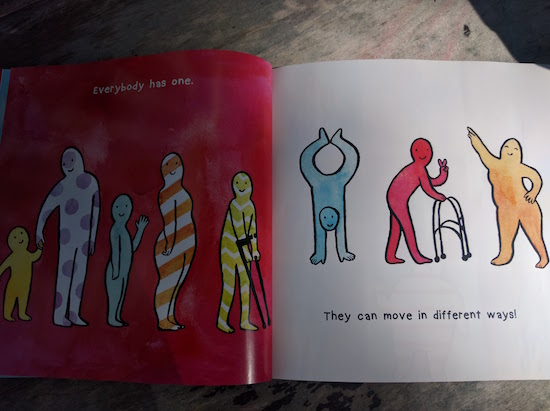
And so this is why I love Roz MacLean’s The Body Book, a simple little paperback with enormous ramifications. Because a mother is going to pick up this book for her child, and they’re both going to enjoy the story’s celebration of bodies of all kinds, shapes, sizes, and abilities: “Some bodies are round./ Some bodies are straight./ Some bodies are wavy./ All bodies are GREAT!!!” She writes about bodies that swim and play, and dance all day, and bodies that love hugs, and bodies that need space, and rocking bodies and rolling bodies, and wibbly bodies, and wobbly bodies too.
All well and good, illustrated with simple cheerful images of blobby bodies in a rainbow of colours all doing what bodies do.
The very best thing about The Body Book though, the most excellent and profound, is that every time that mother reads the book, she’s going to have to deliver the line, “I love my body. Do you love yours too?” A line that, as I’ve stated, is actually one of the bravest, most amazing things that a woman can say.
And I love that once that mother has said it enough, there is a chance she might actually mean it.
August 23, 2016
The Best Kind of People, by Zoe Whittall
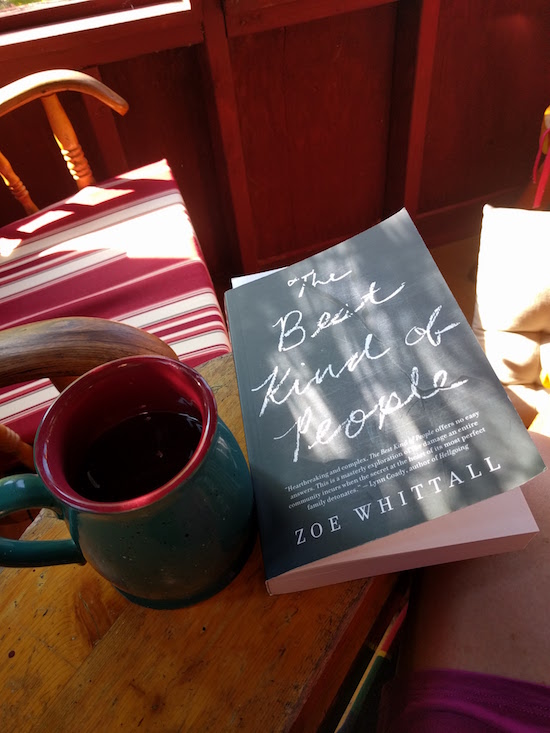
While Zoe Whittall has made a career of writing about misfits and outlaws (which is part of the title of an anthology she edited in the early 2000’s), she turns the tables in her latest novel by writing about a family of unremarkable (were it not for their resolute upstandingness) middle class people who suddenly become misfits and outlaws in their very own lives. The book is The Best Kind of People, which I read on my summer vacation and handed directly to my husband when he asked me what book he should read next. And the family is the Woodburys, the patriarch of whom shocks his wife and children and entire community when he’s accused of sexual assaulting girls at the high school where he teaches.
“How could a person do such a thing?” is the kind of question that tends to be raised after the fact, although Whittall is more interested in another question with wider ramifications, which is, “How can the people around that person, the people who love that person, who did it make sense of their lives and the world once he has?” Joan Woodbury tries to make sense of her past and her future—what was her marriage all of these years, and who is she going to become outside of the relationship that has so long defined her? She deals with threats and violence against her home and family, hears the whispers and the rumours, and knows that many people implicate her along with her husband, because as his wife, how could she not have known?
Her daughter carries many of the same burdens with her at school, and is forced to reconcile her own burgeoning sexuality with her father’s egregious crimes, not to mention falls in with a group of Men’s Rights Activists who try to use her and her father as a pawn for their cause. And when the Woodbury’s son returns home from his life in New York to take care of his family and support his father, he’s forced to confront his own difficult past as a gay boy coming of age in a small conservative town.
Similar to Joan Thomas’s novel, The Opening Sky, The Best Kind of People ponders how the politics and morality of well-meaning, liberal-minded people are tested when they find themselves in situations they never expected. In Whittall’s book, the result is a complicated range of emotions and reactions, and while she puts her characters through test after test, the result every time in believable, entirely (and sometimes unbearably) human. There is so much nuance here, but the book is also devourable, utterly gripping, unfolding with the pace of a thriller and also that hard to put down, as the case unfolds day by day and then week by week, right up until the trial.
While the entire book is fantastic, Whittall gets full points for her spectacular ending, however, which turns the story inside out and disturbingly rips us away from the singular perspectives of characters to reflect the wider culture of rape and sexual violence against whose context the entire novel has been taking place. Which is to say that this is not just a story about a family.
And then the final sentence, which will haunt you long after you’ve finally finished reading, quiet, subtle, devastating and terrible, just like the injustice that is Justice, which isn’t anything like justice at all.





